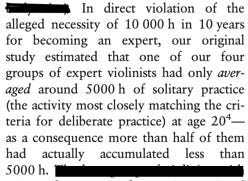The Myth Of Overnight Success
Hint: Success often happens over decades, not years.
Debunking The 10,000 Hour Rule
K. Anders Ericsson is Swedish psychology professor at Florida State University, and an expert on expert performance. In 2013, he wanted to set the record straight from his colleagues on what truly makes an expert. Specifically, separating himself from the popular idea that it takes 10,000 hours of deliberate practice to achieve mastery in a skill.1

Ericsson found that among elite violinists, the average amount of solitary practice within the group was only 5,000 hours. And more than half accumulated less than 5,000 hours of solitary practice.
Becoming An Expert
Let’s say you want to become a recognized expert in something. How much time would you need to practice to truly become renowned? Would it take 1,000 hours? 25,000 hours?
The number of hours to achieve mastery depends on the level of competition in the field you’re competing in.2
“There is nothing magical about exactly 10,000 hours.
Winners of international piano competitions continued full-time practice for many years beyond age 20 and thus accumulated around 25,000 hours at the time of their success.
In other domains, especially less competitive ones, it is possible to reach an international level in much less time.
In the early 1980s my colleagues and I demonstrated that college students could reach a world-class performance for memorizing digits after 500-1,000 hours of training.” — K. Anders Ericsson
Want to be an internationally recognized pianist? That’ll take 25,000 hours of deliberate practice.
Want to be world-class at digit memorization? That’ll take only 500-1,000 hours of deliberate practice.
Choose Your “Game”
Naval Ravikant has spoken about using games as a metaphor for life.3
In the “game” you have two options:
Play It and Win It: If it makes you unhappy, you can realize that you’ve won it, and can stop playing. But if it makes you happy, you can keep playing.
Don’t Play It: Not wanting something is as good as having it. That in itself is freedom.
You don’t have to compete for everything in life. But you should compete and win at what matters most to you.
Does family matter to you? Invest time into your family.
Does financial freedom matter to you? Increase your income and lower your expenses.
Does fulfilling work matter to you? Find work provides more autonomy and control.
The Barbell Strategy
In his 2012 book “Antifragile”, Nassim Taleb discusses the Barbell Strategy of investing, where you manage risk by balancing extremely safe and extremely risky options. You avoiding the middle of moderate risk because you face risks without the potential for reward.4
The greatest asset we have is our time. When you think of time as an investment, the Barbell Strategy can be applied to just about every avenue of life:
Career: Have a secure job with stable income, while also pursuing side hustles with potential to have massive
Investments: Put 90% of your portfolio into low cost index funds, while investing 10% into high risk assets that could yield high returns.
Relationships: Maintain deep, secure relationships with close friends and family, while also taking risks to meet new people.
The perils of the middle can lead to a life of stagnation where growth is limited. If you live in the middle for too long, you may wake up one day and ask yourself “Where did the last 5 years go?”
Why This Matters
Time is finite, and your greatest asset. It’s not possible to become an expert at everything. To truly live a life well lived, you need to decide what “games” you want to play which you don’t.
Not every game is created equally. For many games, the greater the reward, the more hours of deliberate practice it will take to win. Choose wisely.
Thanks for reading.
— Grant Varner
Ericsson, K. A. (2013). Training history, deliberate practice, and elite sports performance: An analysis in response to Tucker and Collins' review—What makes champions? British Journal of Sports Medicine, 47(9), 533-535. https://doi.org/10.1136/bjsports-2013-092228
There are exceptions to this rule. For instance, if you are a man living in the US, between the ages of 20 and 40, and over 7 feet tall, your chances of making it to the NBA are approximately 2.8%.
YouTube video: "Win the Game or Don't Play It [Naval Ravikant, Tim Ferriss]", uploaded by Picking Nuggets, January 19, 2022, https://www.youtube.com/watch?v=IQsA8LACgf4
Taleb, N. N. (2012). Antifragile: Things that gain from disorder. Random House Trade Paperbacks.



⚡️ excellent article
I wonder why people don’t apply this same logic to their spiritual life. But maybe prayer is not strictly speaking a ‘skill’ that can be developed.